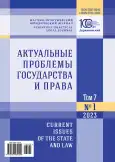Abstract
The relevance of the topic is due to the fact that, for various reasons, citizens have become more likely to turn to such a method of assisted reproductive technologies as surrogacy. At the same time, today this institution has many contradictions in terms of legal regulation. In December 2022, amendments were made to Federal Law No. 538-FZ “On Amendments to Certain Legislative Acts of the Russian Federation” (Collection of Legislation of the Russian Federation, 2022, no. 52, section 9368), the practical implementation of which is designed to eliminate existing problems, however, a number of legal, moral and ethic issues arising from the surrogacy procedure remain unresolved. With this in mind, the purpose of the study is to conduct a legal analysis of surrogacy technology and identify ways to resolve existing contradictions. The methodology consists of dialectical, structural, formal-legal and comparative-legal methods, analysis and synthesis. Within the framework of the study, the legal nature of the surrogacy contract, its content, subject composition were analyzed, the problematic legal aspects of the practical application of surrogacy technology were investigated, including the relationship between the achievement of the purpose of the contract and the consent of the surrogate mother to register genetic parents as such. It is noted that the issues of the implementation of the surrogate mother’s rights to abortion and the possibility of embryonic screening for the presence of genetic diseases before the embryo transplant remain unresolved. The solution to all issues is seen in the development and adoption of a systemic regulatory act regulating the use of surrogacy procedures.








